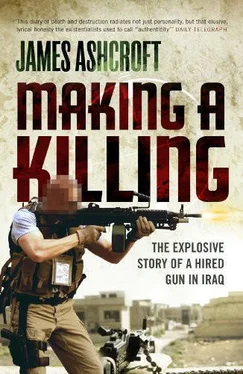Regime change? Even more laughable. There were at least a dozen countries in Africa that had despotic tyrants brutalising their populations.
I told them that the Iraqis tended to believe three main avenues of thought which were just as ridiculous. That the US was there to physically steal the oil; to punish the Iraqis for the first Gulf War (for the defeat imposed on them by Saddam in the Mother Of All Battles◦– that got a laugh at least); or as part of some Zionist plot whereby the Hashemite royalty could move back into Iraq from Jordan and the Israelis could have Jordan, their spiritual homeland, before expanding ever onwards to the Euphrates river.
Economic theories, at least, made sense and revolved around oil. In 2003 the US budget deficit was about $413 billion and the trade deficit $551 billion. So why didn’t the US dollar and the economy collapse? I reckoned it was because all oil purchased from OPEC since 1971 was purchased using US dollars. Every country around the world constantly needs US dollars for their oil-dependent economies and therefore demand for dollars is constant and high. But Iraq had switched to selling oil for euros in 1999. When the euro became stronger against the dollar over the next two years, US analysts suddenly realised that there was a very serious problem. If any other country decided to move to euros and dollar demand dropped, the US economy would be in a shit state. Was that a good enough reason to invade? I don’t know, but one of the first things the Coalition Provisional Authority did in Iraq was switch from trading in euros back to US dollars.
Many educated people would also say, as I had once said to Sammy, that maybe the plan was to flood the global market with Iraqi oil, lower the prices and break OPEC’s monopoly on the world market. But since the invasion, oil had more than doubled in price and the plan had backfired. Or had it? Because once I was in-country and saw the state of the infrastructure and talked to a few engineers, it was obvious that the Iraqi oil industry had been seriously neglected and would need billions of dollars and years to get higher production volumes. It is just my theory but there are two famous oil men in the White House, the President and the Vice-President; and all of a sudden the price of oil doubled, US oil companies have been posting record profits for the last few years. Dick Cheney’s former employer, Halliburton, has been awarded contracts worth billions in Iraq. And, a funny old thing, but with world oil prices doubled, people would need more US dollars to buy it. Strange that. I could also mention that since they now governed Iraq, the US has also acquired a de facto seat on the OPEC cartel through control of Iraq’s energy policy.
Maybe I am just too cynical. I also had thoughts about US hegemonic ambitions. Modern-day economics had done what the CIA had always dreamed of and destroyed communism. Socialist-type governments in the Arab world◦– Egypt, Yemen, Algeria, Libya◦– have had to adapt to free-market forces, and at the same time had become less anti-American. But other large, oil- and resource-rich countries that remained independent of US capitalistic influence have also been threatened. Venezuela, Iran and Iraq all fell into this category. Iraq got invaded, Iran was suddenly labelled as an axis of evil just one month after co-operating with the CIA and handing over details of hundreds of Al Qaeda agents, and Venezuela and their democratically elected President Hugo Chavez are reeling against the ropes as America actively tries to undermine the government. And by way of coincidence, Venezuela, the world’s fourth largest oil producer, and Iran, were also thinking of switching to the euro.
I didn’t bother to share these last thoughts with the men around me. I had already shaken the pillars of their universe by even daring to imagine that the war in Iraq might not all be about 9/11 and fighting Al Qaeda.
‘So if you’re so goddamn clever, why did we invade I-raq ?’ snarled Colonel Hind angrily. Everyone leaned in to hear my answer.
‘I don’t know, mate,’ I replied cheerfully. ‘But I am just a civilian. What I do know is that I should be able to go out there and ask any soldier what he or she’s fighting for and they should know why they are here. But they don’t.’ I looked around at all of them. ‘And I’m sat here with a bunch of senior officers and they can’t tell me why there are American soldiers dying out there every day. And that, gentlemen, is not right.’
I left Colonel Hind amid a little hubbub of discussion and Mad Dog came to walk me out to the pool to meet Seamus and Les. I shouldered my daysack full of books I had borrowed from the welfare library next to the chow hall.
‘Shit, Ash, you’re in a gloomy mood today,’ he said.
‘Yeah, sorry, mate. I guess I am. I’m pissed off at seeing ignorant pricks making insane decisions in here and then having to face our Iraqis and see the disastrous consequences on the streets the next day. I’m pissed off with the fact that Colonel Faisal’s killers are still out running free and I’m pissed off with the fact that he,’ I indicated Colonel Hind with a backwards nod, ‘is about to bale out back to the States and leave you in charge of the Iraqification process so that when it turns into a complete gangfuck–’
‘Which it will,’ he broke in.
‘–which it fucking will. It will be on your career report, not his.’
As we walked out past the smiling Gurkha guards I realised that I was also getting tired of Iraq in general. The team had been out here for over a year now and maybe it was time to go and work in another country. Somewhere with better scoff too, because the food in Iraq was truly appalling. The danger didn’t bother me as much, because apart from just being part of the job, someone took a shot at you◦– what, once a month? But you have to eat three times a day. Part of me also had a foreboding that as autumn drew into winter things were just going to get worse.
During the past twelve months we had trained a guard force and officer structure of 1,500 Iraqi nationals to protect Baghdad’s water supply. After the general election in January 2005, that force would be reorganised and responsibility for security would pass from Spartan to the new Water Minister at the Ministry of Municipalities and Public Works.
Colonel Hind had once observed with rare insight that if the water failed there would be a nationwide uprising. This risk was appreciated at the State Department and, for this reason, Task Force Fountain was kept operational until spring 2005. It was, to my knowledge, the longest lived private security project funded by the US Project and Contracting Office.
The process of ‘Iraqification’ had been progressing throughout the year. What this meant was that contracts awarded to foreign companies were cut short before their tasks had been completed, often with disastrous effects and to the dismay and frustration of officials at the United States Agency for International Development and the Iraq Reconstruction Management Office, as well as their Iraqi counterparts.
Once the State Department, through the Project and Contracting Office, ceased funding reconstruction projects, I was certain that an almost complete breakdown in the country’s infrastructure would occur; Iraq had still not recovered from Ambassador Bremer’s de-Ba’athification order and the removal of tens of thousands of experienced civil administrators.
The new staff moving into the Iraqi ministries owed their posts more to their blood relationship to the respective minister than to operational competence. To me, the State Department and CF leadership were no better and operated an insular old-boy network. Many State Department civilians and senior US officers who had served in Iraq came with one eye on promotion and had tended towards writing reports that would both serve to make them look good and would be what their superiors wanted to read, Colonel Hind being a prime example. They were more concerned with their future careers than making a difference and drastically undermined the good work being done by the many hard-working officers and civil staff who were genuinely trying to help rebuild Iraq.
Читать дальше












